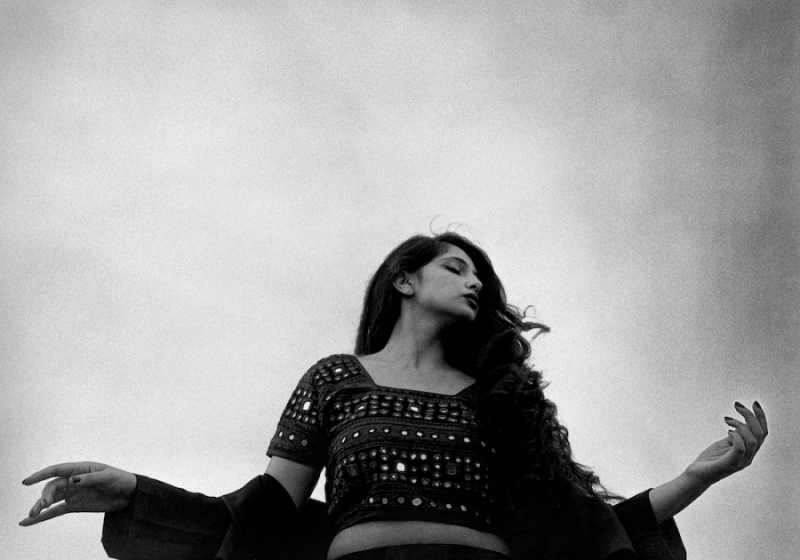The Breakdown
‘Sheherazaad’ translated in Hindi and Urdu means a “free city” which is at odds to her mini-album, ‘Qasr’, which translates to “castle” or “fortress” in Urdu, it was written during a time of family estrangement, grief over a lost elder, and the racial polarisation of her country as she knew it.
“It was maddening” Sheherazaad says, “that the music of my origins didn’t yet exist. So I knew I would have to make it.” Born to what she describes as a “fanatically art-centered, Asian-American household”, Sheher began her ear training at home, with both her parents being band musicians and her grandmother a trailblazing Indian classical concert producer. At home, she absorbed the life portfolios of Lata Mangeshkar and RD Burman, while beginning formal voice education in jazz and American Songbook from the age of six.
Relocating to California, for vocal rehabilitation, Sheherazaad found her Northern Star in the Hindustani classical guru Madhuvanti Bhide, who helped Sheher reshape her old voice, using “Gharana” methodology. In a further attempt to re-access lost heritage, Sheher also studied Arabic, Hindi, and Urdu, where she quickly advanced and wrote test lyrics. These would result in her self-released 2020 underground project Khwaabistan, and garner the attention of experimental Pakistani artist Arooj Aftab, who offered to produce Sheher’s next record.
Working long-distance from separate coasts during the pandemic, the pair got to work on Qasr. The collaboration would culminate in the heart of Brooklyn at the Glass Wall studio, during late-night, feverish recording sessions and utilising a groundbreaking cast of international musicianship, including Basma Edrees (Egypt), Gilbert Mansour (Lebanon), and Firas Zreik (Palestine).
‘Qasr’ is an album of meditation that starts with the intricate ‘Mashoor’ (“Famous”). Beautifully finger work on an acoustic guitar, courtesy of Ria Modak, soothes with Sheher’s seductive vocals and the gentle flowing of water creating a space of peace. The electrified playing of the acoustic and simple percussion caries on the hypnotic quality as Sheherazaad’s intimate vocals speak directly to your soul.
Second track Dhund Lo Mujhe (“Search For Me”) awakens the sense with a lively violin that takes off on flights of fantasy encompassing the dark and creamy vocals. “For me, it brings up this circus of the insane, carnival of the unhappy,” she explains. “It suggests a very specific insanity, that of the immigrant experience. There is implied bloodshed, glamour, hallucination, and schizophrenia.”
The summery ‘Koshish’ (“Try”) sounds like it was recorded in a huge hall with the shimmery reverb on the bass and swaying lilting vocals. “It’s a way of paying homage to my Californian upbringing, revamping the surfer genre with brown beach bodies and hidden Oud as the axis of the song.”
‘Khatam’ (“Finished”) brings in piano on this fascinating minimalistic album. What Sheher manages to do with the slimmed down instrumentation is a wonder. The album sounds sonically huge even when all we have is vocals and piano. Sounding almost too fragile here there are huge leaps of vocal prowess climbing scales only to fall back down and start again leaving the listener enraptured.
The end comes too soon but what an ending. Final composition ‘Lehja’ expands the instrumentation as Sheher crafts a sonic landscape that sits on a knife edge with a nervous feeling created by the wandering piano, bursts of frantic stringed instruments and the gentle twinkling of wind chimes. The songs inner strength emerges and you are a left with the sad feeling of having to return to reality once it finishes.
It’s an exciting mini album that puts quality over quantity. What Sheherazaad has done here is written music that she needs to write as it speaks and interests her and in turn you can’t help but be sucked in. It’s a mini masterpiece that should be in every serious music lover’s collection.
This is an important album not because of what Sheher has to say but in the manner she conveys it. Wearing her culture proudly she weaves south asian qualities with a Western touch, however, it’s that voice that you can’t get over. It’s deep and engaging, at times healing but also frightening, manic and desperate. Yet one thing can be said there is no turning away and once the music has its grip there is no letting go.
Check out the track Mashoor, below:
Purchase the album here














No Comment